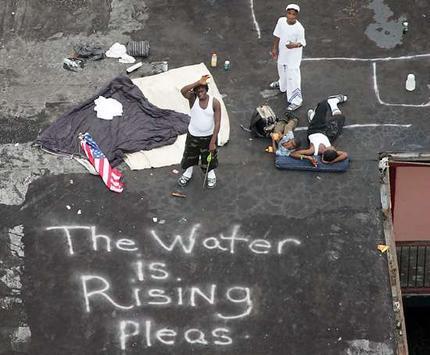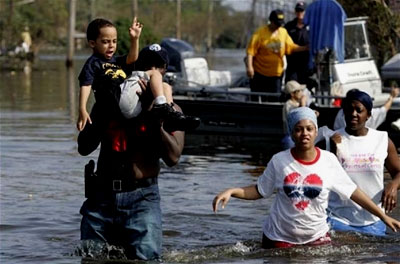 My best friend was a survivor from hurricane Katrina. Over the past 8 years I have seen on-going
how it has affected his life. I asked
him to answer the questions posed for this week’s blog. The response from the government for the
families that were involved in hurricane Katrina was more oppression given to
people of color and lower income families.
I believe with my heart and soul had this or any other devastating
weather event occurred in a predominately white population there would have
been no hesitation for emergency assistance.
The response was utterly inhuman in my eyes. I am reminded by the
effects that this hurricane has on my friend because of things he does and
things that he says. His way of life is
different than mine or yours. We don’t
think about planning for such an event and living our lives as if a
catastrophic event may happen in the next 5 minutes. Sleeping bags, emergency
food, extra clothes, water, blankets all are contained in his truck. Cargo on top loaded with other stuff. When I first saw all this stuff I didn’t
understand. Why would anyone keep that
much stuff in their vehicle? Over the
years I have gained a greater understanding and hence a bitterness I hold in my
heart because of the effect it has on him.
His answers below just barely touch the oppression he saw and felt. His children were with him. The knee high water he had to trek through to
get to safety. Although, he was clearly
not safe. In this case the government was to blame. They knew the issues that needed to be
repaired with the levies. Because it was a black community it was not a
priority. The government responded
slowly as well because who cares about poor black people? That was the oppressive message that was
sent.
My best friend was a survivor from hurricane Katrina. Over the past 8 years I have seen on-going
how it has affected his life. I asked
him to answer the questions posed for this week’s blog. The response from the government for the
families that were involved in hurricane Katrina was more oppression given to
people of color and lower income families.
I believe with my heart and soul had this or any other devastating
weather event occurred in a predominately white population there would have
been no hesitation for emergency assistance.
The response was utterly inhuman in my eyes. I am reminded by the
effects that this hurricane has on my friend because of things he does and
things that he says. His way of life is
different than mine or yours. We don’t
think about planning for such an event and living our lives as if a
catastrophic event may happen in the next 5 minutes. Sleeping bags, emergency
food, extra clothes, water, blankets all are contained in his truck. Cargo on top loaded with other stuff. When I first saw all this stuff I didn’t
understand. Why would anyone keep that
much stuff in their vehicle? Over the
years I have gained a greater understanding and hence a bitterness I hold in my
heart because of the effect it has on him.
His answers below just barely touch the oppression he saw and felt. His children were with him. The knee high water he had to trek through to
get to safety. Although, he was clearly
not safe. In this case the government was to blame. They knew the issues that needed to be
repaired with the levies. Because it was a black community it was not a
priority. The government responded
slowly as well because who cares about poor black people? That was the oppressive message that was
sent.

Can something be diminished if it was there to
begin with? What has to be understood about Katrina or any catastrophic
event that bring to light an accepted norm of economic oppression of an
ethnicity is now there's a camera broadcasting it. With that being said,
it has to be understood that for many people during Katrina the only thing that
changed in their lives was the storm. Being poor or "kept" by
assistance being handed out by the government was a way of life, an accepted
means to an end. Or a better way for me to put this would be, does a
child know he or she is poor? The answer in most cases is no, it’s not
until it's pointed out that they come to understand that they are. It has
to be understood that New Orleans (proper) is a majority ethnic city (black).
There are dividing lines such as, Uptown, The Garden District, and of course the
French quarter is European held areas of the city. For me the only thing
Katrina showed was a life of how the majority of black people lived in New
Orleans. Poor and not truly owning anything, uneducated and not looking
or willing to reach higher and further to be successful, black men
entrenched in a cage and feeding on itself.

I have a dislike for how good black people were
stereotyped as all being thugs, crooks, shoplifters, and ignorant. Which isn't
true, there were a lot of good people that lost everything they called their
own. There were a lot of good people that died because they truly
couldn't leave. It's easy to say, they should have just left, if you
don't have the means, you have no where to go. Lastly, I'm bitter because
it could be implied that the city didn't matter, excluding the French-Quarter,
Canal Street, and St. Charles Ave. Areas that aren't owned by those that
built and supported the city on their backs.
Oppression, I don't believe I felt any while I was
there, because I wasn't from there. I wasn't the norm, I reached higher
and further, I knew that I was poor and had been hungry and I didn't and don't
like it.
D. Smith, Personal Communication, February 13, 2015.



